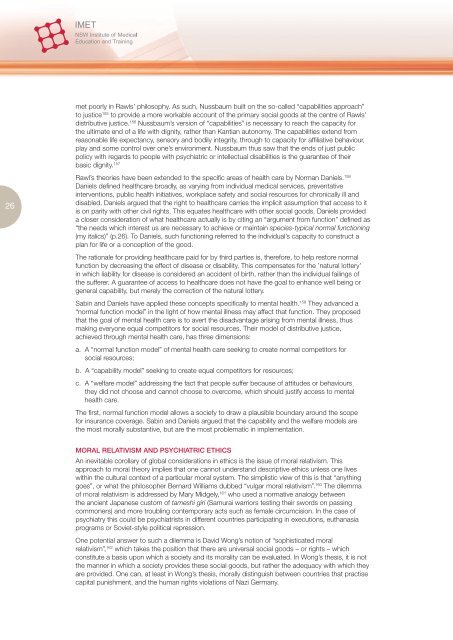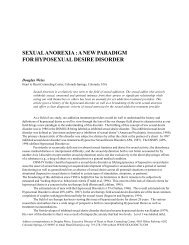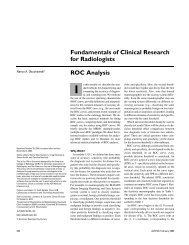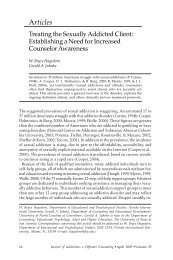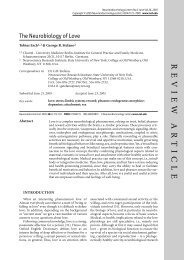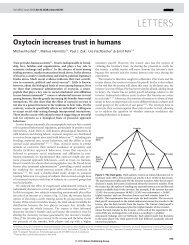An Overview of Psychiatric Ethics
An Overview of Psychiatric Ethics
An Overview of Psychiatric Ethics
You also want an ePaper? Increase the reach of your titles
YUMPU automatically turns print PDFs into web optimized ePapers that Google loves.
met poorly in Rawls’ philosophy. As such, Nussbaum built on the so-called “capabilities approach”to justice 155 to provide a more workable account <strong>of</strong> the primary social goods at the centre <strong>of</strong> Rawls’distributive justice. 156 Nussbaum’s version <strong>of</strong> “capabilities” is necessary to reach the capacity forthe ultimate end <strong>of</strong> a life with dignity, rather than Kantian autonomy. The capabilities extend fromreasonable life expectancy, sensory and bodily integrity, through to capacity for affiliative behaviour,play and some control over one’s environment. Nussbaum thus saw that the ends <strong>of</strong> just publicpolicy with regards to people with psychiatric or intellectual disabilities is the guarantee <strong>of</strong> theirbasic dignity. 15726Rawl’s theories have been extended to the specific areas <strong>of</strong> health care by Norman Daniels. 158Daniels defined healthcare broadly, as varying from individual medical services, preventativeinterventions, public health initiatives, workplace safety and social resources for chronically ill anddisabled. Daniels argued that the right to healthcare carries the implicit assumption that access to itis on parity with other civil rights. This equates healthcare with other social goods. Daniels provideda closer consideration <strong>of</strong> what healthcare actually is by citing an “argument from function” defined as“the needs which interest us are necessary to achieve or maintain species-typical normal functioning(my italics)” (p.26). To Daniels, such functioning referred to the individual’s capacity to construct aplan for life or a conception <strong>of</strong> the good.The rationale for providing healthcare paid for by third parties is, therefore, to help restore normalfunction by decreasing the effect <strong>of</strong> disease or disability. This compensates for the ’natural lottery’in which liability for disease is considered an accident <strong>of</strong> birth, rather than the individual failings <strong>of</strong>the sufferer. A guarantee <strong>of</strong> access to healthcare does not have the goal to enhance well being orgeneral capability, but merely the correction <strong>of</strong> the natural lottery.Sabin and Daniels have applied these concepts specifically to mental health. 159 They advanced a“normal function model” in the light <strong>of</strong> how mental illness may affect that function. They proposedthat the goal <strong>of</strong> mental health care is to avert the disadvantage arising from mental illness, thusmaking everyone equal competitors for social resources. Their model <strong>of</strong> distributive justice,achieved through mental health care, has three dimensions:a. A “normal function model” <strong>of</strong> mental health care seeking to create normal competitors forsocial resources;b. A “capability model” seeking to create equal competitors for resources;c. A “welfare model” addressing the fact that people suffer because <strong>of</strong> attitudes or behavioursthey did not choose and cannot choose to overcome, which should justify access to mentalhealth care.The first, normal function model allows a society to draw a plausible boundary around the scopefor insurance coverage. Sabin and Daniels argued that the capability and the welfare models arethe most morally substantive, but are the most problematic in implementation.MORAL RELATIVISM AND PSYCHIATRIC ETHICS<strong>An</strong> inevitable corollary <strong>of</strong> global considerations in ethics is the issue <strong>of</strong> moral relativism. Thisapproach to moral theory implies that one cannot understand descriptive ethics unless one liveswithin the cultural context <strong>of</strong> a particular moral system. The simplistic view <strong>of</strong> this is that “anythinggoes”, or what the philosopher Bernard Williams dubbed “vulgar moral relativism”. 160 The dilemma<strong>of</strong> moral relativism is addressed by Mary Midgely, 161 who used a normative analogy betweenthe ancient Japanese custom <strong>of</strong> tameshi giri (Samurai warriors testing their swords on passingcommoners) and more troubling contemporary acts such as female circumcision. In the case <strong>of</strong>psychiatry this could be psychiatrists in different countries participating in executions, euthanasiaprograms or Soviet-style political repression.One potential answer to such a dilemma is David Wong’s notion <strong>of</strong> “sophisticated moralrelativism”, 162 which takes the position that there are universal social goods – or rights – whichconstitute a basis upon which a society and its morality can be evaluated. In Wong’s thesis, it is notthe manner in which a society provides these social goods, but rather the adequacy with which theyare provided. One can, at least in Wong’s thesis, morally distinguish between countries that practisecapital punishment, and the human rights violations <strong>of</strong> Nazi Germany.


